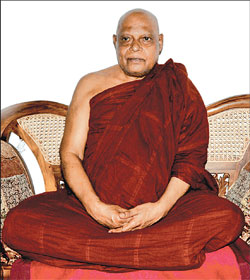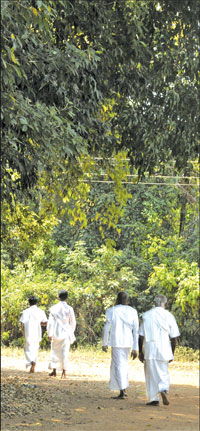Your, deed, your guide
Most Venerable Na Uyané
Ariyadhamma Thera of the Na Uyana Forest Monastery, Kurunegala in a
special discussion on the Dhamma with the Daily News, enlightens
readers on various matters related to the Dhamma ranging from day
today issues to meditation. The Thera is a renowned meditation Guru
and the Spiritual Advisor of the Sri Kalyani Yogasrama Samstha. The
first part of this interview appeared last week.
Samangie WETTIMUNY
|

Na Uyané Ariyadhamma Thera
|
|
Most Venerable Na Uyané Ariyadhamma
Thera of the Na Uyana Forest Monastery, Kurunegala in a special
discussion on the Dhamma with the Daily News, enlightens readers
on various matters related to the Dhamma ranging from day today
issues to meditation. The Thera is a renowned meditation Guru
and the Spiritual Advisor of the Sri Kalyani Yogasrama Samstha.
The first part of this interview appeared last week. |
Q: In Mahaseehanada Sutta the Buddha had stated that "The memory
power of a Buddha is such that it does not even change slightly even
though he lives over 100 years."
A: The Buddha is an extraordinary human being and is incomparable
with any other person in the world. The intensity of merit of Paramitas
(Perfections) is far greater than the merit accumulated by all the
beings in the entire world. Even at the age of 80, the Buddha did not
have grey hair and his teeth were intact. A Buddha will not live 100
years. He will live only 4/5th of the span of life allotted to man.
At the age of 100 anyone will get physical disabilities, but a Buddha
will never live until his physical appearance decays and becomes
unpleasant to look at.
There is no other person in the whole world to surpass the mental
faculties of the Buddha. The Enlightened One is called "Sathi Mantha"
because however much he grows old his mental capacities and memory power
do not deteriorate even the least. The alacrity of his responsiveness is
so great that he can respond to any query before the four archers
shooting their shafts at a Palmyra tree reach the target.
Q: What was the Buddha's attitude on partaking of fish and meat?
A: The Buddha had never directly stated that one should consume or
not consume meat. In all the dispensations of the Buddhas three
conditions have been laid down about partaking of fish and meat - a monk
if he wishes, could partake meat or fish if it is not seen, heard or
suspected to have been killed on purpose for a monk. Also he advised the
monks to avoid ten kinds of meat.
That involves a decision of avoiding the violation of a minor
disciplinary rule; it is not distinct whether it will tantamount to an
unwholesome act.
Q: The ten kinds of meat the Buddha had advised monks not to consume
are the flesh of humans, elephants, horses, dogs, snakes, lions, tigers,
leopards, bears and hyenas. Is it not an indirect indication that it is
quite alright to consume the flesh of other animals?
A: No, by no means had the Buddha approved eating of animal flesh.
When Devadatta thera made a request from the Buddha to make it a rule
that monks should exclusively refrain from animah flesh , what the
Buddha said was that we should not be extremists.
During the time of the Buddha there were people who entered the Order
from villages, who had been depending entirely on animal flesh. Such
people find it difficult to get adjusted to the new situation.
|

Pictures by Saman Sri Wedage |
The Buddha did not directly refuse meat consumption because there
would be people who would need it. He did not make it a rule. A person
can consume meat, if the above mentioned three conditioned are
fulfilled.
However what is important here is not whether a person consumes meat
or not, what matters is whether he has a greed for it. What should be
avoided or restrained is consuming meat or fish with greed.
Q: However when it comes to a person who is entirely engaged in
meditation, isn't it more appropriate for him to completely abstain from
consuming animal flesh?
A: It is not a rule. However by experience I can tell you that it
gives you a lot of mental and physical relief if you are a vegetarian .
Meat belongs to "Olarika" (gross and heavy) food group.
Consuming food items that are not easily digestible is a hindrance
for the development of meditation.If a person consumes 'Praneetha"
(pleasant and easy to digest) foods, it is easy to develop Pas Addhi
Sambhojjhanga.
Meat consumption is conducive to disease.
When I was schooling I abstained from all types of meat and fish and
it was a relief. I could easily remember everything I studied. When I
abstained from consuming animal flesh I felt a great mental ease.
But as I entered the Order, in the early days I had to partake meat
items such as sprats and fish on the advise of senior monks who said
that it is not something prohibited for monks.
Hence for a short period I used to consume fish with reluctance.
After I started consuming these food items my memory power deteriorated,
I felt somewhat dizzy and felt a sense of heaviness about me. Hence I
ceased to consume fish or meat.
Today I enjoy great mental and physical ease. Subsequently when
medical tests have been done it was revealed that none of those ailments
common to persons of my age is found in me except for some minor
ailments that are due to age.
What I want to emphasize here is abstaining from heavy foods helps
you in meditation.
There are doctors who say that it is necessary to consume fish to
prevent gastritis, but by experience I know that there are plant foods
which could be very fine substitutes.
Q: Buddhism stands unique in denying the existence of Atman. It
preaches soullessness (Anatma). Many lay Buddhists do not seem to know
what this means exactly. Please explain.
A: According to the Buddha, Anicca (Impermanence), Dukkha
(Suffering), Anatma (Soullessness), are common to all living beings.
Even in periods beyond Buddha's dispensation Impermanence and Suffering
are in existence. However it is only Buddhism which emphasizes on
Soullessness (Anatma).
There are religions which emphasizes on the existence of an "Atman."
According to Saswatha Drushtiya, each individual has a soul, Atman
created by god, and after death it lives eternally in heaven. (Bamba
Lowa) The Buddha denied the existence of Atman.
The explanation is this. People normally use the terms "I" and "my".
However if our self belongs to us we should be able to keep it the way
we want.
When the naked ascetic Sachchaka who believed that the body is one's
self came to argue with the Buddha over the matter the Buddha said if
body is one's self why cannot anyone control it just the way King of
Magadha, or King of Pasenadi can control people in their kingdoms by
punishing wrong doers. If the self belongs to us why cannot a person
keep his/her hair black, or prevent his/her teeth from falling out.
Q: Many Buddhists are in the habit of worshipping and offering Poojas
to gods expecting them to fulfill their wishes in return. What should be
the stand point of Buddhists on Gods.
A: In fact this is something which needs serious thought. Offering
Poojas to gods and expecting them to fulfill human wishes is a myth.
The following story is a fine example. In the Vimanavatthu Prakarana,
we come across Serissaka Vimanavatthu which contains the story of Payasi
who was reborn in heaven as God Serissaka. The chief God Waisarawana
asked him to undertake the task of helping out vendors who had lost
their way while travelling from India to Cambodia.
One day 900 vendors lost their way in the midst of the journey. Among
them there was one poor, but pious person who was a barber by
profession. God Serissaka who saw that he was in trouble reached out to
him. After directing the group to their destination and having done the
needful, god Serissaka asked them whether they know as to why he came to
their rescue. Then the group members said that it was because all of
them prayed and pleaded for the help of the gods.
"No, We, gods do not respond to prayers or Poojas offered expecting
our benevolence. I came here because there was only one pious person in
the group who leads a religious life observing the Five and Eight
precepts." The group of 900 vendors then pleaded with the god to accept
the Pooja which they 'll offer in his name once they returned to their
home country. "Neither you or me will benefit by these offerings. They
are useless."
Then pointing at the barber he further added. " The great help you
can do me is to be religious and virtuous like him. You have to engage
in good deeds so that you can pass on merit to the gods."
People do various offerings to gods, but they are useless. What you
should do is to conduct Buddha Poojas, and pass on the merit to gods.
Then they will help and protect us. No need to pray. What they need most
is merit. They are aware of the importance of merit than human beings.
[email protected] |



